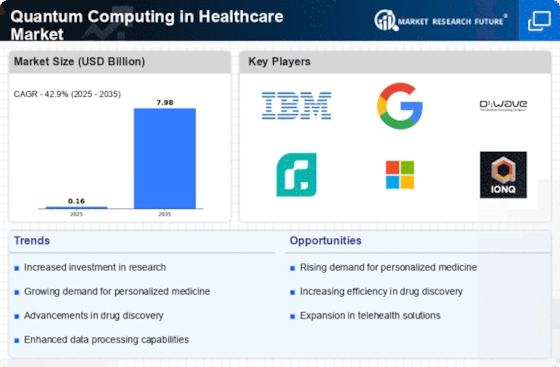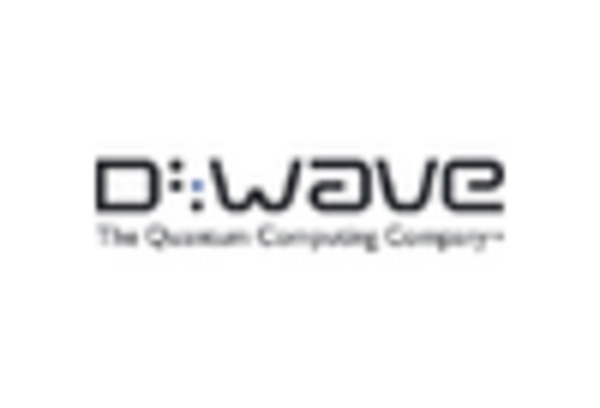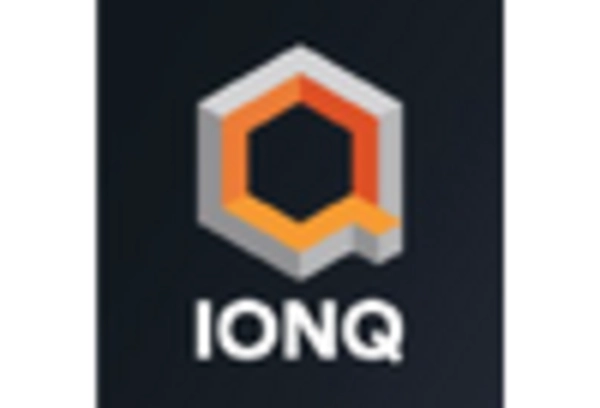Hardware
Software
Services
Superconducting Qubits
Trapped Ions
Quantum Annealing
Others
Drug Discovery and development
Medical Diagnostics
Genomics and Precision Medicine
Radiotherapy
Risk Analysis
Others
Pharmaceutical and Biopharmaceutical Companies
Labs and Research Institutes
Healthcare Providers
Healthcare Payers
On premises
Cloud Based
Quantum Computing in Healthcare Market by ComponentHardware
Software
Services
Quantum Computing in Healthcare Market by TechnologySuperconducting Qubits
Trapped Ions
Quantum Annealing
Others
Quantum Computing in Healthcare Market by ApplicationDrug Discovery and development
Medical Diagnostics
Genomics and Precision Medicine
Radiotherapy
Risk Analysis
Others
Quantum Computing in Healthcare Market by End-UserPharmaceutical and Biopharmaceutical Companies
Labs and Research Institutes
Healthcare Providers
Healthcare Payers
Quantum Computing in Healthcare Market by DeploymentOn premises
Cloud Based
Quantum Computing in Healthcare Market by ComponentHardware
Software
Services
Quantum Computing in Healthcare Market by TechnologySuperconducting Qubits
Trapped Ions
Quantum Annealing
Others
Quantum Computing in Healthcare Market by ApplicationDrug Discovery and development
Medical Diagnostics
Genomics and Precision Medicine
Radiotherapy
Risk Analysis
Others
Quantum Computing in Healthcare Market by End-UserPharmaceutical and Biopharmaceutical Companies
Labs and Research Institutes
Healthcare Providers
Healthcare Payers
Quantum Computing in Healthcare Market by DeploymentOn premises
Cloud Based
Quantum Computing in Healthcare Market by ComponentHardware
Software
Services
Quantum Computing in Healthcare Market by TechnologySuperconducting Qubits
Trapped Ions
Quantum Annealing
Others
Quantum Computing in Healthcare Market by ApplicationDrug Discovery and development
Medical Diagnostics
Genomics and Precision Medicine
Radiotherapy
Risk Analysis
Others
Quantum Computing in Healthcare Market by End-UserPharmaceutical and Biopharmaceutical Companies
Labs and Research Institutes
Healthcare Providers
Healthcare Payers
Quantum Computing in Healthcare Market by DeploymentOn premises
Cloud Based
Quantum Computing in Healthcare Market by ComponentHardware
Software
Services
Quantum Computing in Healthcare Market by TechnologySuperconducting Qubits
Trapped Ions
Quantum Annealing
Others
Quantum Computing in Healthcare Market by ApplicationDrug Discovery and development
Medical Diagnostics
Genomics and Precision Medicine
Radiotherapy
Risk Analysis
Others
Quantum Computing in Healthcare Market by End-UserPharmaceutical and Biopharmaceutical Companies
Labs and Research Institutes
Healthcare Providers
Healthcare Payers
Quantum Computing in Healthcare Market by DeploymentOn premises
Cloud Based
Germany Outlook (USD Billion, 2018-2032)
Quantum Computing in Healthcare Market by ComponentHardware
Software
Services
Quantum Computing in Healthcare Market by TechnologySuperconducting Qubits
Trapped Ions
Quantum Annealing
Others
Quantum Computing in Healthcare Market by ApplicationDrug Discovery and development
Medical Diagnostics
Genomics and Precision Medicine
Radiotherapy
Risk Analysis
Others
Quantum Computing in Healthcare Market by End-UserPharmaceutical and Biopharmaceutical Companies
Labs and Research Institutes
Healthcare Providers
Healthcare Payers
Quantum Computing in Healthcare Market by DeploymentOn premises
Cloud Based
Quantum Computing in Healthcare Market by ComponentHardware
Software
Services
Quantum Computing in Healthcare Market by TechnologySuperconducting Qubits
Trapped Ions
Quantum Annealing
Others
Quantum Computing in Healthcare Market by ApplicationDrug Discovery and development
Medical Diagnostics
Genomics and Precision Medicine
Radiotherapy
Risk Analysis
Others
Quantum Computing in Healthcare Market by End-UserPharmaceutical and Biopharmaceutical Companies
Labs and Research Institutes
Healthcare Providers
Healthcare Payers
Quantum Computing in Healthcare Market by DeploymentOn premises
Cloud Based
Quantum Computing in Healthcare Market by ComponentHardware
Software
Services
Quantum Computing in Healthcare Market by TechnologySuperconducting Qubits
Trapped Ions
Quantum Annealing
Others
Quantum Computing in Healthcare Market by ApplicationDrug Discovery and development
Medical Diagnostics
Genomics and Precision Medicine
Radiotherapy
Risk Analysis
Others
Quantum Computing in Healthcare Market by End-UserPharmaceutical and Biopharmaceutical Companies
Labs and Research Institutes
Healthcare Providers
Healthcare Payers
Quantum Computing in Healthcare Market by DeploymentOn premises
Cloud Based
Quantum Computing in Healthcare Market by ComponentHardware
Software
Services
Quantum Computing in Healthcare Market by TechnologySuperconducting Qubits
Trapped Ions
Quantum Annealing
Others
Quantum Computing in Healthcare Market by ApplicationDrug Discovery and development
Medical Diagnostics
Genomics and Precision Medicine
Radiotherapy
Risk Analysis
Others
Quantum Computing in Healthcare Market by End-UserPharmaceutical and Biopharmaceutical Companies
Labs and Research Institutes
Healthcare Providers
Healthcare Payers
Quantum Computing in Healthcare Market by DeploymentOn premises
Cloud Based
Quantum Computing in Healthcare Market by ComponentHardware
Software
Services
Quantum Computing in Healthcare Market by TechnologySuperconducting Qubits
Trapped Ions
Quantum Annealing
Others
Quantum Computing in Healthcare Market by ApplicationDrug Discovery and development
Medical Diagnostics
Genomics and Precision Medicine
Radiotherapy
Risk Analysis
Others
Quantum Computing in Healthcare Market by End-UserPharmaceutical and Biopharmaceutical Companies
Labs and Research Institutes
Healthcare Providers
Healthcare Payers
Quantum Computing in Healthcare Market by DeploymentOn premises
Cloud Based
Quantum Computing in Healthcare Market by ComponentHardware
Software
Services
Quantum Computing in Healthcare Market by TechnologySuperconducting Qubits
Trapped Ions
Quantum Annealing
Others
Quantum Computing in Healthcare Market by ApplicationDrug Discovery and development
Medical Diagnostics
Genomics and Precision Medicine
Radiotherapy
Risk Analysis
Others
Quantum Computing in Healthcare Market by End-UserPharmaceutical and Biopharmaceutical Companies
Labs and Research Institutes
Healthcare Providers
Healthcare Payers
Quantum Computing in Healthcare Market by DeploymentOn premises
Cloud Based
Quantum Computing in Healthcare Market by ComponentHardware
Software
Services
Quantum Computing in Healthcare Market by TechnologySuperconducting Qubits
Trapped Ions
Quantum Annealing
Others
Quantum Computing in Healthcare Market by ApplicationDrug Discovery and development
Medical Diagnostics
Genomics and Precision Medicine
Radiotherapy
Risk Analysis
Others
Quantum Computing in Healthcare Market by End-UserPharmaceutical and Biopharmaceutical Companies
Labs and Research Institutes
Healthcare Providers
Healthcare Payers
Quantum Computing in Healthcare Market by DeploymentOn premises
Cloud Based
Quantum Computing in Healthcare Market by ComponentHardware
Software
Services
Quantum Computing in Healthcare Market by TechnologySuperconducting Qubits
Trapped Ions
Quantum Annealing
Others
Quantum Computing in Healthcare Market by ApplicationDrug Discovery and development
Medical Diagnostics
Genomics and Precision Medicine
Radiotherapy
Risk Analysis
Others
Quantum Computing in Healthcare Market by End-UserPharmaceutical and Biopharmaceutical Companies
Labs and Research Institutes
Healthcare Providers
Healthcare Payers
Quantum Computing in Healthcare Market by DeploymentOn premises
Cloud Based
Quantum Computing in Healthcare Market by ComponentHardware
Software
Services
Quantum Computing in Healthcare Market by TechnologySuperconducting Qubits
Trapped Ions
Quantum Annealing
Others
Quantum Computing in Healthcare Market by ApplicationDrug Discovery and development
Medical Diagnostics
Genomics and Precision Medicine
Radiotherapy
Risk Analysis
Others
Quantum Computing in Healthcare Market by End-UserPharmaceutical and Biopharmaceutical Companies
Labs and Research Institutes
Healthcare Providers
Healthcare Payers
Quantum Computing in Healthcare Market by DeploymentOn premises
Cloud Based
Quantum Computing in Healthcare Market by ComponentHardware
Software
Services
Quantum Computing in Healthcare Market by TechnologySuperconducting Qubits
Trapped Ions
Quantum Annealing
Others
Quantum Computing in Healthcare Market by ApplicationDrug Discovery and development
Medical Diagnostics
Genomics and Precision Medicine
Radiotherapy
Risk Analysis
Others
Quantum Computing in Healthcare Market by End-UserPharmaceutical and Biopharmaceutical Companies
Labs and Research Institutes
Healthcare Providers
Healthcare Payers
Quantum Computing in Healthcare Market by DeploymentOn premises
Cloud Based
Quantum Computing in Healthcare Market by ComponentHardware
Software
Services
Quantum Computing in Healthcare Market by TechnologySuperconducting Qubits
Trapped Ions
Quantum Annealing
Others
Quantum Computing in Healthcare Market by ApplicationDrug Discovery and development
Medical Diagnostics
Genomics and Precision Medicine
Radiotherapy
Risk Analysis
Others
Quantum Computing in Healthcare Market by End-UserPharmaceutical and Biopharmaceutical Companies
Labs and Research Institutes
Healthcare Providers
Healthcare Payers
Quantum Computing in Healthcare Market by DeploymentOn premises
Cloud Based
Quantum Computing in Healthcare Market by ComponentHardware
Software
Services
Quantum Computing in Healthcare Market by TechnologySuperconducting Qubits
Trapped Ions
Quantum Annealing
Others
Quantum Computing in Healthcare Market by ApplicationDrug Discovery and development
Medical Diagnostics
Genomics and Precision Medicine
Radiotherapy
Risk Analysis
Others
Quantum Computing in Healthcare Market by End-UserPharmaceutical and Biopharmaceutical Companies
Labs and Research Institutes
Healthcare Providers
Healthcare Payers
Quantum Computing in Healthcare Market by DeploymentOn premises
Cloud Based
Quantum Computing in Healthcare Market by ComponentHardware
Software
Services
Quantum Computing in Healthcare Market by TechnologySuperconducting Qubits
Trapped Ions
Quantum Annealing
Others
Quantum Computing in Healthcare Market by ApplicationDrug Discovery and development
Medical Diagnostics
Genomics and Precision Medicine
Radiotherapy
Risk Analysis
Others
Quantum Computing in Healthcare Market by End-UserPharmaceutical and Biopharmaceutical Companies
Labs and Research Institutes
Healthcare Providers
Healthcare Payers
Quantum Computing in Healthcare Market by DeploymentOn premises
Cloud Based
Quantum Computing in Healthcare Market by ComponentHardware
Software
Services
Quantum Computing in Healthcare Market by TechnologySuperconducting Qubits
Trapped Ions
Quantum Annealing
Others
Quantum Computing in Healthcare Market by ApplicationDrug Discovery and development
Medical Diagnostics
Genomics and Precision Medicine
Radiotherapy
Risk Analysis
Others
Quantum Computing in Healthcare Market by End-UserPharmaceutical and Biopharmaceutical Companies
Labs and Research Institutes
Healthcare Providers
Healthcare Payers
Quantum Computing in Healthcare Market by DeploymentOn premises
Cloud Based
Quantum Computing in Healthcare Market by ComponentHardware
Software
Services
Quantum Computing in Healthcare Market by TechnologySuperconducting Qubits
Trapped Ions
Quantum Annealing
Others
Quantum Computing in Healthcare Market by ApplicationDrug Discovery and development
Medical Diagnostics
Genomics and Precision Medicine
Radiotherapy
Risk Analysis
Others
Quantum Computing in Healthcare Market by End-UserPharmaceutical and Biopharmaceutical Companies
Labs and Research Institutes
Healthcare Providers
Healthcare Payers
Quantum Computing in Healthcare Market by DeploymentOn premises
Cloud Based
Quantum Computing in Healthcare Market by ComponentHardware
Software
Services
Quantum Computing in Healthcare Market by TechnologySuperconducting Qubits
Trapped Ions
Quantum Annealing
Others
Quantum Computing in Healthcare Market by ApplicationDrug Discovery and development
Medical Diagnostics
Genomics and Precision Medicine
Radiotherapy
Risk Analysis
Others
Quantum Computing in Healthcare Market by End-UserPharmaceutical and Biopharmaceutical Companies
Labs and Research Institutes
Healthcare Providers
Healthcare Payers
Quantum Computing in Healthcare Market by DeploymentOn premises
Cloud Based


















Leave a Comment